America’s Cup: Insight into life in Bermuda
Published on September 9th, 2015
 Two-time Olympic medallist Rod Davis, after being closely associated as a coach for Emirates Team New Zealand, is now gearing up for his ninth America’s Cup campaign with Artemis Racing. In a column for Seahorse magazine, Davis shares his observations of Bermuda…
Two-time Olympic medallist Rod Davis, after being closely associated as a coach for Emirates Team New Zealand, is now gearing up for his ninth America’s Cup campaign with Artemis Racing. In a column for Seahorse magazine, Davis shares his observations of Bermuda…
What is the world coming to? When Bermuda was announced as the venue for the 2017 America’s Cup, most yachting circles reacted with stunned silence. The same way the football world reacted to FIFA saying the football World Cup would be held in Qatar in 2022.
The fact is Bermuda is one-seventh the land size of the Isle of Wight, and the population is two-and-a-half times smaller. Mind you Bermuda is 640-miles from America’s east coast. Closer to the US than the UK, even if it is still a British colony.
But we are not going to debate the next AC venue – I just want to give you an insight into life in Bermuda, and what the world is coming to when the next America’s Cup is held. We have just spent the last month working and sailing here and we have learned plenty.
People like to compare Bermuda to a combination of the Caribbean, England, and the US. Not sure how you blend those, but it’s not the Bermuda I see. Bermuda is more like… well, Bermuda is unique and special.
The racecourse is small, very small, but protected all the way around, except for the channel that leads to the Royal Naval Dockyard. That is good news, as the water is smooth most of the time, ideal for foiling at high speed.
There will be plenty of action when we have six teams out practicing, race boats foiling along at 30+ knots, and two chase boats each trying desperately to keep up. Bermuda will take the America’s Cup tradition of ‘tender wars’ to a whole new level!
Throw in spectator boats, day sailors, and the locals who just want to fish, and everyone will have to keep their wits about them. And, by the way, while the Royal Naval Dockyard at one end of the Island is south of St George at the other end of the Island, you go ‘up’ to the Royal Naval Dockyard, and ‘down’ to St George when you are in Bermuda – that’s just the way it is here.
The cool thing is the water; it is emerald coloured and clear as glass. On shore, colour is everywhere. Tradition means you can have any colour house you want, and they do. The brighter the better. Every shade of yellow, blue, pink and green seem to be the most popular.
You can have any colour roof you want too, as long as it’s white! The regulators require all roofs to be painted with white, lime-based paint. And repainted every three years; so the roofs are immaculate! Bermuda is dependent on rainwater, and a great source of that comes from the roofs of houses. Thus the regulations.
The speed limit on the roads of the island is 35 kilometres per hour – for those who still think in imperial, that is 21 miles per hour (but the correct answer on the driver’s licence exam, is 35kph – 21mph will fail you). That really is the maximum speed on the island… 21mph. Hmmm, don’t be in a rush. And Bermudians aren’t. They have the patience of Job. Lord knows they need it for the cruise ship tourists.
Bermuda used to boast of the perfect holiday destination, two hours’ flying time from the east coast of the United States, just six from England. Warm clear water, pink sand beaches, and the tax-free financial capital of the Atlantic. It had hotels everywhere, and flash ones at that. Then came the crash, and for whatever reason the tourists came to Bermuda on cruise ships instead of planes. And boy did they come…
Tourists on cruise ships stay for two days maximum. They don’t eat in the local restaurants, they don’t stay in the hotels – they have all that on the ship, already paid for. They buy a trinket or two, or a silly t-shirt that says ‘Have a Bermudaful Day’, and go back to their ship. Little effect, if any, on the economy.
That is why the America’s Cup was, and is, a very big deal to Bermuda. Imagine six teams of 80-families each, coming to live in Bermuda for two years. Each family buying groceries, renting houses, getting hair cuts, sending the kids to schools, doctors and dentists. Along the way, the money gets re-spent by each shopkeeper, waitress, or taxi driver.
In San Francisco, with its large population and great wealth, the Cup had very little effect. For Bermuda, the America’s Cup will have a major impact on a country that, frankly, needs and deserves some good news about its economy.
There are big challenges to face though. Simple things like schools. The influx of America’s Cup children will push the local school system to the limit, particularly the private schools. You can’t rent cars in Bermuda. In fact, to own a car, you need to first be a resident (the AC crews will need to have a work permit), then get a driver’s licence, and rent a house with a ‘unique assessment number’ that allows that house to own a car.
Not every house has such a number available so check before you rent (in some instances, a homeowner may have already registered a car with the house number which precludes the tenant from using that number). And if they do have that all-important number free to use, there is still only ‘one four-wheeled vehicle per person or family or household’ anyway. So other transport will be a fact of life for all families on the island.
That comes down to scooters, bicycles, or public transport (buses and ferries). The trains were discontinued in the late ’40s when cars were first introduced to Bermuda, but this now means the old railway trail is a wonderful track, the length of the Island (though divided into half a dozen or more sections) for safe walking, running or cycling.
WARNING: driving scooters in Bermuda can be (will be) dangerous to your health! The roads are narrow, passing on blind corners is a game, and to the scooter driver the posted speed limits are treated more as a suggestion.
FACT: Bermuda has a horrendous record of serious scooter accidents and the majority of fatalities every year involve scooters, not cars. Every team will be visiting fellow team members in the King Edward VII Memorial Hospital at some time. Rumour has it, Oracle has already had four in there at the same time, for a variety of reasons; very fortunately, the boys are all okay.
I am not being pessimistic, I am being a realist. The numbers just work that way. The bus and ferry system is great during daylight hours. Not always to the published time table, but they do seem to work. We like the bus; it’s a great way to become immersed in the local culture. The bus drivers are fabulous. Funny how you can become a local in no time when you’re at the same bus stop each day.
I have had one bus driver open his door and yell ‘you’re late! The boat went in the water 20 minutes ago!’ Another tour bus driver stopped, opened the door and motioned me in. Not sure if it was a good idea or not, I asked ‘you going to Dockyard?’ (site of the base). His response, ‘I am not going to London, am I?’
One thing you do, and everyone does, is greet the people as you board the bus. Something like ‘beautiful day’, ‘hello everyone’, or even ‘God bless you all’. If you don’t, you’re considered rude. The drivers won’t start until you’re seated (correct bus ‘etiquette’) so there is no rush. And don’t get up at your stop until the bus has come to a complete stop (more bus ‘etiquette’). No rush, we all get there. Maybe that is why the timetable gets a wee bit out of whack at the end of the route?
You get an unlimited bus and ferry pass for $US62 per week…or $US69 per month. Go figure.
As an event the America’s Cup has gone through remarkable changes and hopefully Bermuda can capitalise on the spin-offs of the 2017 regatta. Big challenges are ahead for all.
NOTE: This column was re-published with permission from Seahorse magazine (August 2015). Information about Seahorse can be found HERE.


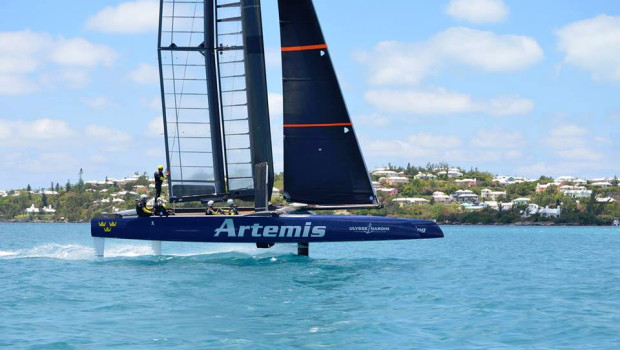



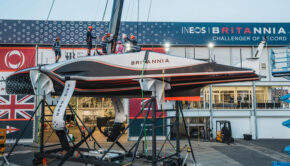
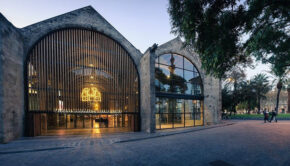
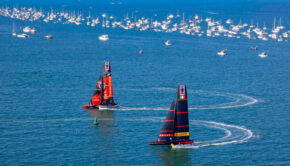
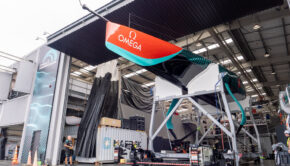
 We’ll keep your information safe.
We’ll keep your information safe.